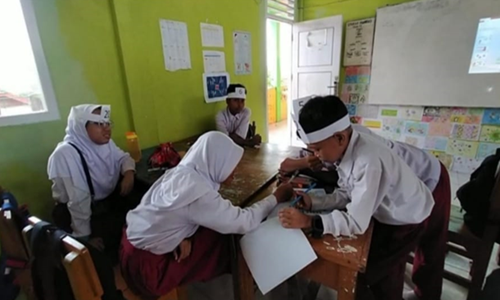
Application of the TPACK Approach in Increasing Student Learning Activity Through the PBL Model in Mathematics Learning in Class V Elementary Schools
Abstract
Keywords
Full Text:
PDFReferences
Agusti, R. H., Nasir, M., & Islami, N. (2023). Implementation of Contextual Teaching and Learning Based Physics Module on Newton's Law Material to Improve Critical Thinking Skills of Class X Students. Journal of Education and Learning Research, 1(1), 8-19.
Amrina, Z., Anwar, V. N., Alfino, J., & Sari, S. G. (2022). Technological Pedagogical Content Knowledge Analysis of the Ability to Develop Online Mathematics Learning Tools for Prospective Elementary School Teachers. Scholar's Journal. Journal of Mathematics Education, 6(1), 1069-1079.
Anitra, R. (2021). Jigsaw Type Cooperative Learning In Mathematics Learning In Elementary Schools. Indonesian Journal of Basic Education, 6(1), 8-12.
Anugraheni, I. (2018). Meta Analysis of Problem-Based Learning Models In Increasing Critical Thinking Skills In Elementary Schools [A Meta-Analysis Of Problem-Based Learning Models In Increasing Critical Thinking Skills In Elementary Schools]. Polyglot: A Scientific Journal, 14(1), 9-18.
Arikunto S. (2019). Research Procedures A Practical Approach. Jakarta: Rineka Cipta.
Asih, R. P. W. (2021). The Influence of Individual Characteristics and Compensation on Turnover Intention. Journal of Management and Business Research, 25-35.
Athnindya, A. (2023). Implementation of TPACK in the Al-Quran Education Park as Educational Reform. Proceedings of the National Conference on Innovative Education, 1(1), 66-71.
Batubara, H. H. (2017). Information and Communication Technology (ICT). Deepublish.
Bella, S., Azhar, A., & Nur, I. (2023). Development of Think-Pair-Share (Tps) Model Based Learning Tools for Global Warming Materials. Journal of Education and Learning Research, 20-29.
Budiman, H. (2017). The Role Of Information and Communication Technology in Education. Al-Tadzkiyyah: Journal of Islamic Education, 8(1), 31-43.
Gusnarib, G., & Rosnawati, R. (2021). Learning and Learning Theories. West Java: Adab Publishers.
Haniefa, R., & Samsudin, M. (2023). Application of Technological Pedagogical and Content Knowledge (Tpack) in Teaching Arabic Language Skills. Ta'limi| Journal of Arabic Education and Arabic Studies, 2(1), 61-72.
Hanik, E. U., Puspitasari, D., Safitri, E., Firdaus, H. R., Pratiwi, M., & Inayah, R. N. (2022). Integration of Tpack Approaches (Technological, Pedagogical, Content Knowledge) For Cycle Elementary School Teachers In Implementing Digital Era Learning. JEID: Journal of Educational Integration and Development, 2(1), 15-27.
Hanum, H., Niah, S., & Pahmi, P. (2023). The Development of Podcast-Based-Audio Learning in Material Introducing Ourselves at 10th Grade SMA Muhammadiyah 1 Pekanbaru. Journal of Education and Learning Research, 37-46.
Hasanah, Z., & Himami, A. S. (2021). Cooperative Learning Model In Fostering Student Learning Activity. Irsyaduna: Journal of Student Studies, 1(1), 1-13.
Irmita, L. U., & Atun, S. (2017). Development of Learning Tools Using The Tpack Approach to Increase Scientific Literacy. JTK (Tadris Kimiya Journal), 2(1), 84-90.
Kanza, N. R. F,. Lesmono, A. D,, & Widodo, H. M. (2020). Analysis of Student Learning Activeness Using A Project Based Learning Model with A Stem Approach In Learning Physics About Elasticity In Class XI MIPA 5 SMA Negeri 2 Jember. Journal of Physics Learning, 9(2), 71-77.
Kusumawati, I. T., Soebagyo, J., & Nuriadin, I. (2022). Literature Study of Critical Thinking Ability with the Application of the PBL Model to the Constructivist Theory Approach. Journal MathEdu (Mathematic Education Journal), 5(1), 13-18.
Maira, W., Raihani, F., & Nurma, N. (2022). Application of the Project Based Learning Model Using the TPACK Approach to Increase the Activeness of Class VI Students at SD 55/I Sridadi in Science Subjects. Journal of Education and Counseling (JPDK), 4(6), 12313-12321.
Mairisiska, T., Sutrisno, S., & Asrial, A. (2014). Development of TPACK-based learning tools on colligative properties of solutions to improve students' critical thinking skills. Edu-Science: Journal of Mathematics and Natural Sciences Education, 3(1).
Masrinah, E. N., Aripin, I., & Gaffar, A. A. (2019, October). Problem Based Learning (PBL) to Improve Critical Thinking Skills. In Proceedings of the National Seminar on Education (1), 924-932.
Mutmainah, S., & Julaeha, J. (2021). Application of the Learning Model Using Learning Houses (Vol. 01). Ministry of Education and Culture's Data and Information Center.
Mutia, M. (2021). Characteristics of Children Age of Basic Education. Fitrah: International Islamic Education Journal, 3, 114-31.
Nurfatimah, N., Affandi, L. H., & Jiwandono, I. S. (2020). Analysis of the Learning Activity of High School Students at SDN 07 Sila during the Covid-19 pandemic. Scientific Journal of the Education Profession, 5(2), 145-154.
Nursyam, A. (2019). Increasing Student Interest in Learning Through Information Technology-Based Learning Media. Expose: Journal of Law and Education Research, 18(1), 811-819.
Rikawati, K., & Sitinjak, D. (2020). Increasing Student Learning Activeness By Using Interactive Lecture Methods. Journal of Educational Chemistry (JEC), 2(2), 40.
Ruqoyyah, S., Murni, S., & Linda, L. (2020). Ability to Understand Mathematical Concepts And Resilience with VBA Microsoft Excel. Purwakarta: CV. Tre Alea Jacta Pedagogie.
Sari, S. K, Syaiful, S., & Anggereini, E. (2021). The Effect of Implementing LKPD Based on The Tpack Framework On Junior High School Students' Mathematics Learning Outcomes In Terms Of Problem Solving. Scholar's Journal: Journal of Mathematics Education, 5(2), 923-934.
Stefani, S., Elva, N., & Sumiati, C. (2021). Improving the Integrated Thematic Learning Process Using The TPACK-Based Problem Based Learning (PBL) model in Class V SDN 07 Pandam Gadang. Tambusai Education Journal, 5(2), 3255-3260.
Susilawati, E., & Khaira, I. (2021). Increasing Student Creativity in Designing TPACK-Based Learning Plans as Learning Integration in the Era of Society 5.0. In E Proceedings of the 2021 National Seminar on Pancasila and Citizenship Education.
Syamsidah, S., & Hamidah Suryani, H. (2018). Problem Based Learning (PBL) Model Book: Food Ingredient Knowledge Course. Yogyakarta: Deepublish.
Wibowo, N. (2016). Efforts to Increase Student Activity Through Learning Based On Learning Styles at SMK Negeri 1 Saptosari. Elinvo (Electronics, Informatics, and Vocational Education), 1(2), 128-139.
Yanuarti, R. A (2021). Module 05 Optimizing the Use of ICT in 21st Century Learning. pdf. Ministry of Education and Culture's Data and Information Center.
DOI: http://dx.doi.org/10.31258/jes.8.1.p.103-117
Refbacks
- There are currently no refbacks.
Copyright (c) 2024 Laura Mustika

This work is licensed under a Creative Commons Attribution 4.0 International License.
Publisher: FKIP Universitas Riau












